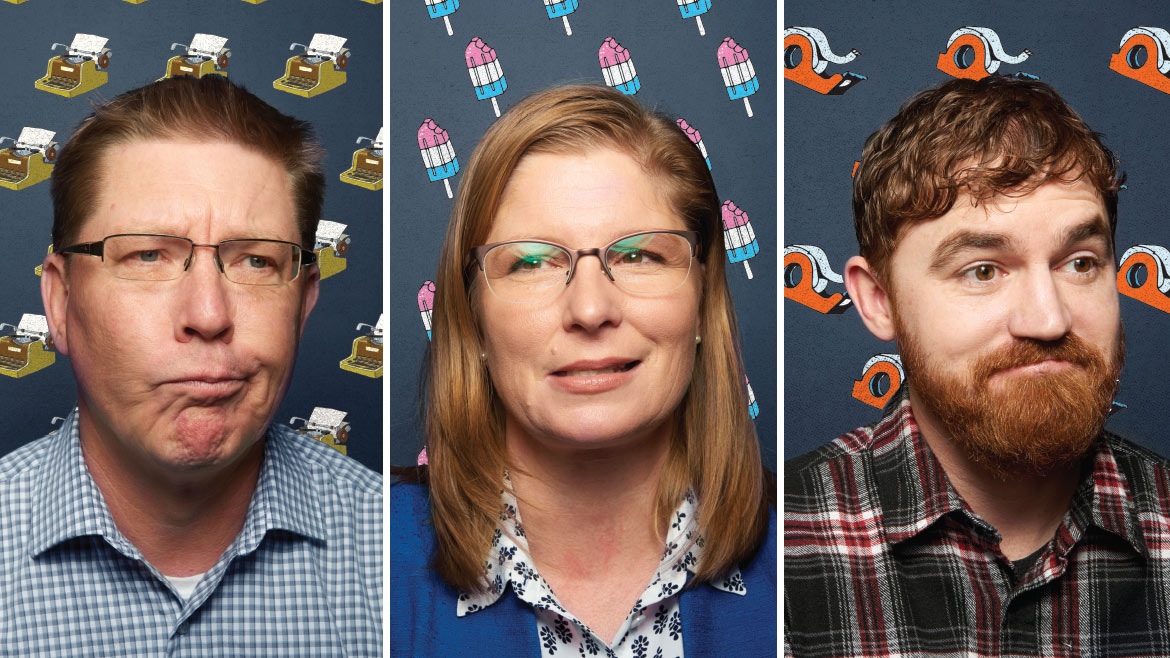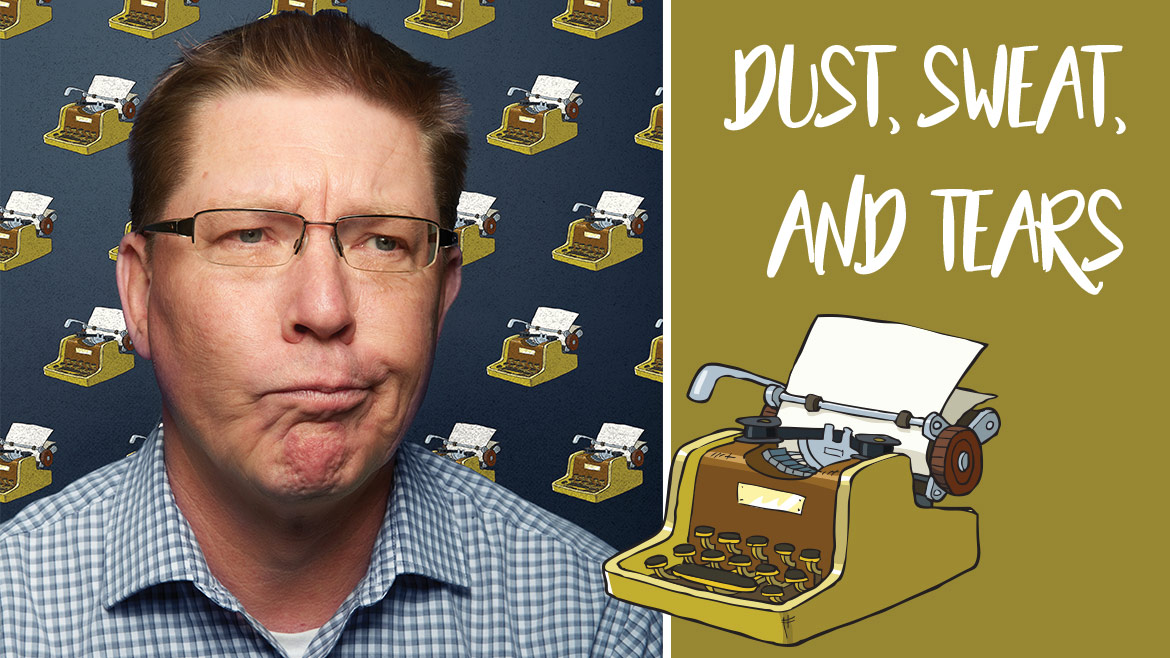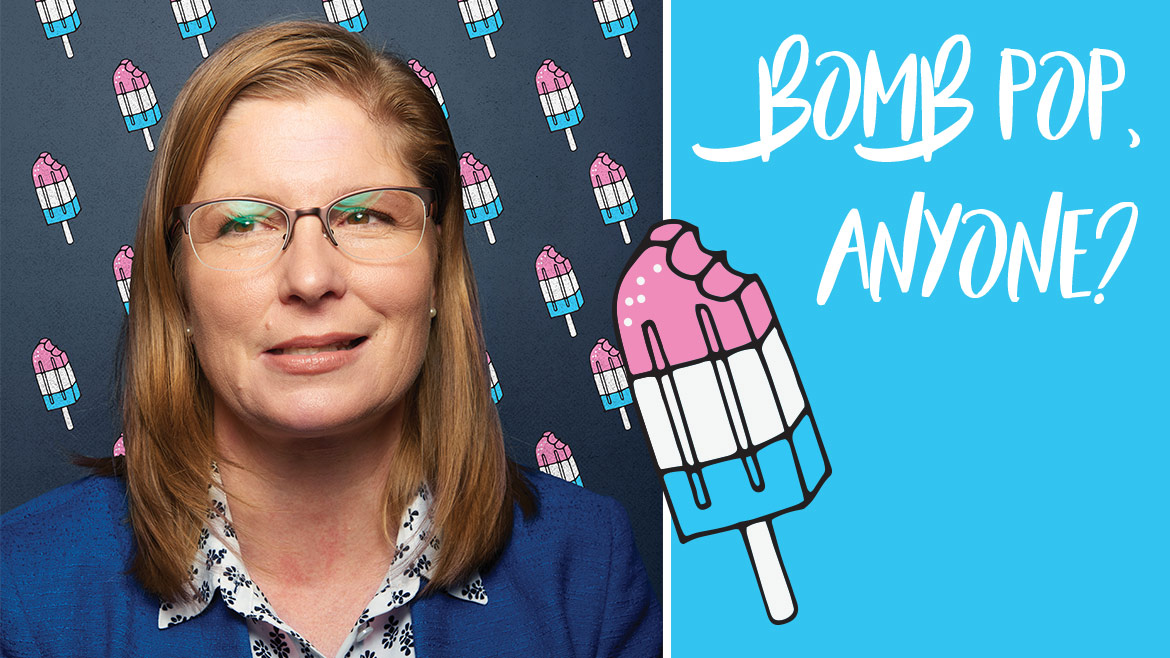Typewriters and Lint Balls and Ice Cream, Oh My!
- photos by Keith Borgmeyer

When asked about her first job, Stephens College president Dianne Lynch was in a quandary as to which job to talk about.
“Do you mean my very first job, when I worked 45 hours a week for the summer after eighth grade, babysitting three children and doing all the cooking, cleaning, laundry, and ironing for 75 cents an hour?” she asked.
Or maybe her second job, when she was 14 and earned a real paycheck for de-tasseling corn in the fields outside Madison, Wisconsin. “I earned $1.25 an hour and got so sunburned that I had blisters on my blisters,” she says. “That was the hardest job of my life.”
Or maybe her first real job was her third job, when she decided to find a better fit. “My first professional job was as a teen model at the local department store in Madison,” Lynch says. “I got a new wardrobe every season, modeled in the fashion shows, and got paid to work in the juniors’ department.”
Lynch’s decision to join the workforce as a teenager is familiar to most. According to the Bureau of Labor Statistics, 97 percent of all young adults have held a job sometime between leaving high school and age 22. But not all first jobs are created equal. For three local business owners, first jobs meant unusual summers comprised of typewriters, ice cream, and lint.

Brad Eiken’s first job was helping his dad at Check Office Equipment. “I would unbox, assemble, label and re-box calculators for shipment to various locations across the state,” Eiken says.
Another duty involved going into high schools over summer break to collect typewriters and perform annual maintenance. Eiken would load the typewriters into a van and take them back to the office, where he would disassemble them for a thorough cleaning, soften the platens with an emery cloth, clean every key head with solvent and a tooth brush, and then reassemble the units.
“It was a very hot and laborious job,” Eiken says, “and it involved a lot of black dust in my nose, ears, and eyes.”
The schools were without elevators and air conditioning, so the job included hauling 50-pound pieces of equipment up and down stairs. “I was the little guy of the bunch,” Eiken says, “but I wanted to be like the big guys, so I would carry two at a time, one in each hand.”
The result? “A lot of mental toughness,” Eiken says. Today, he owns Inside the Lines Commercial Interiors.
Eiken worked in the office equipment industry in college as well. “My first full-time job was with my father,” he says. “We had the state contract for word processing equipment and electronic typewriters.” Like at his first job, Eiken was responsible for unboxing and setting up these machines. He would then arrange for delivery of the equipment and provide training classes to the users.
“While I was being a trainer, I also started developing business in Columbia,” Eiken says. “One day a week, I would travel from Jeff City to Columbia and promote Check Office Equipment.” The year was 1985, and he had just turned 20.
The following fall, Check opened its first branch office, in Columbia. Eiken has been part of the Columbia business community ever since.

Jen Hedrick’s job in 1987 was as Ice Cream Man of Marshall, Missouri.
“My cousins and I had a small business when I was in high school: an old bread truck converted into an ice cream truck,” Hedrick says. “My dad and uncle purchased it for us to explore the world of entrepreneurship.”
The experience gave Hedrick, now a principal with Simon Oswald Architecture, a glimpse into the realities of making a profit. “It was empowering and rewarding to see kids running towards us with smiles on their faces and money in hand,” she says.
The thrill was so intoxicating that the crew fought over whose turn it was to take the truck out, each wanting a larger share of the profits.
Looking at their stacks of cash, the teens thought they’d made a killing — until Hedrick’s dad and uncle presented them with the bills for the products and gas. Suddenly, swimming with friends sounded like more fun than selling them sweet treats in the sweltering heat.
“Soon we were fighting over whose turn it was, but we were trying to get out of the work,” she says.
Hedrick learned a great deal that summer: that strong relationships with co-workers and customers are critical, that the cost of doing business is measured in both dollars and time, and that having the right inventory is crucial.
The experience also gave her a lesson in driving.
“The truck was a manual transmission, three speed on the column, but had a tendency to get stuck in third, so it was a slow go in second gear cruising the park, neighborhoods, and town square,” Hedrick explains. It took a little coordination to steer the huge wheel while shifting gears and simultaneously pulling a string that connected to the truck’s brass bell. She’s proud to say, “There were none of those cheesy pre-recorded songs over the loud speaker for this crew!”

Tyson Hunt was also 16 when his mom made him get a summer job.
“I went to work at the Hallmark card factory in my hometown of Moberly, Missouri,” says Hunt, the CEO/Captain of Logboat Brewing Co. “It was called Carrolton Specialties, and this was the job that motivated me to go to college.”
Hunt describes the scene: “I sat at a desk, adjacent to a long conveyor belt, where I would put my full box of finished cards when they were ready to be sent down the line, placed on a pallet and shipped out. I had a very large ball of lint on my desk, a tape dispenser, and a box of empty cards.”
Hunt’s job was to pull off a small piece of lint from the huge ball, put some tape on it, and tape it to the inside of the card. The card read as follows:
Front cover
“For your birthday I decided to dig down deep into my pocket to get you something special.”
Inside
“This is all I came up with.”
“And there was the beautiful ball of lint taped to the inside,” Hunt says. “I put that lint there — it was all me!”
Hunt taped lint for eight hours a day, five days a week.
“I think I lasted a month before I had to get out of there,” he admits. “Then I decided that a college education was something I really wanted and would need so I would never have to make Hallmark cards again.”


